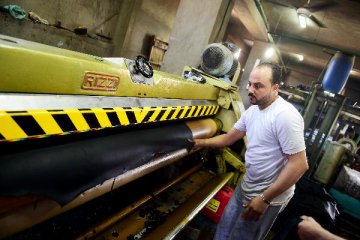
As China's yuan approaches the 7 to the dollar barrier, investors are betting authorities will eventually let the currency fall beyond the historic level. Yet they are just as confident that China won't allow the kind of capitulation seen in past market meltdowns.
The Chinese currency has fallen 10 percent against the dollar since March, when the first set of tit-for-tat tariffs in the U.S.-Sino trade war were announced, and has been inching close to the psychologically significant 7 figure, a decade low.
Although the central bank has not directly intervened to stem this decline against a strengthening dollar, it has signaled it won't allow excessive volatility. Policy insiders have told Reuters authorities will fight a rapid descent in the yuan.
Data from currency reserves and commercial bank operations, however, suggest capital outflows are rising, possibly as investors bet on a yuan decline.
"It is natural that people in China want to hedge themselves," said Cliff Tan, East Asia head of global markets research at MUFG, in Hong Kong.
"This is a sign that capital outflow is increasing, but it is not a sign of capital flight. They may have to tighten capital controls further eventually."
Few expect a replay of the 2015-2016 sell-off that caused China's stock markets to plunge and the yuan to fall 11 percent over 17 months. The stringent capital controls enacted then are still in force, companies have less foreign debt and China still has $3 trillion of currency reserves, should it need to defend the yuan.
Still, the backdrop of a trade war that has caused mainland stocks to lose a quarter of their value this year, rising U.S. yields and monetary easing at home mean investors aren't putting blind faith in the yuan's stability.
Commercial banks in China have pumped $28.1 billion into markets so far this year, a contrast from 2017 when they mopped up dollars. These banks sold a net $17.6 billion of foreign exchange to retail clients in September, the most in 15 months.
"The data represents the view that many locals, including importers, think the yuan will be weaker as the dollar strengthens further," said Iris Pang, Greater China economist at ING Wholesale Banking.
Eric Stein, Boston-based co-director of the global income group at Eaton Vance Management, who manages approximately $20 billion, said his team has been running short positions in the yuan for the past five months or so.
"What China has right now is a policy preference for modestly weaker but not significantly weaker currency. That would probably be an impetus for increasing the short position," he said.
The short-yuan trade has worked as an effective hedge in recent months for the M&G (Lux) Dynamic Allocation strategy, said Graziano Creperio, a London-based investment specialist with the firm.
About 6 percent of the $10.5 billion fund's net asset value is in the short yuan trade, protecting the fund's 2 percent long position in Chinese equities.
"Were very positive on equities...if were wrong about being too bullish about it, then we would expect this currency to depreciate," Creperio said. "Were hedging, in a small fashion, but at least it created a little bit of buffer and protection."
In the options and forward markets, bets that the yuan will hit 7 soon have been rising, despite China pushing up funding costs to make it more expensive for speculators to short-sell the currency.
Yet, the flows so far have been small. China has spent only about $53 billion of its reserves this year, a fraction of the trillion dollars it burned in 2015 and 2016.
"From our conversations with corporates, we're not sensing panic," said Lu Sun, a China currency strategist at Citi. "There are outflows via banks, but it's about $10 billion per month in recent months, compared with about $100 billion in late 2015."
And the PBOC hasn't minced its words for the bears.
"For those who are trying to short the renminbi, we are very familiar with each other as we fought hand to hand a few years ago," Pan Gongsheng, deputy central bank governor, said on Friday. "I think it's still fresh in our memory."




















Latest comments